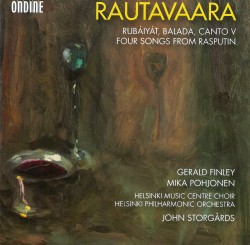 Rautavaara – Rubaiyat; Balada; Canto V; Four Songs from Rasputin
Rautavaara – Rubaiyat; Balada; Canto V; Four Songs from Rasputin
Gerald Finley; Mika Pohjonen; Helsinki Music Centre Choir; Helsinki Philharmonic; John Storgårds
Ondine ODE 1274-2
Amongst the works that took the composer’s entire life to complete, pride of place belongs to Rubaiyat. Rautavaara vowed to set Edward FitzGerald’s 19th-century translation of The Rubaiyat of Omar Khayyam in 1949, while still a music student. It took 63 years and prodding in the form of a commission from Wigmore Hall for a song cycle destined for Gerald Finley. Well, it was well worth the wait. Rubaiyat is nothing short of a magical piece of music. Over the years, Rautavaara’s musical style transmuted from neo-classicism, dodecaphony, serialism, neo-romantic and post-modern styles into a unique synthesis of all of these, as Kimmo Korhonen writes in detailed liner notes. The music shimmers and glistens, while creating quite a challenge for the voice – the almost continuous melodic lines, requiring circular breathing. Finley, whose voice sounds even better than in the past (a small gift that Father Time dispenses to some baritones and mezzos) excels at bringing into his interpretation the philosophical stance of Khayyam. The rich mix of orchestral and vocal colour is intoxicating. This is most definitely one of those gems that will be taken out of its box and admired frequently – both by listeners and singers. The rest of the album is by no means just filler. It contains Balada, an abandoned and then truncated opera based on texts by Lorca, and arias from Rautavaara’s latest opera, Rasputin.
The young Finnish tenor, Mika Pohjonen and the Helsinki Music Centre Choir are perfect partners to Finley in this venture.



